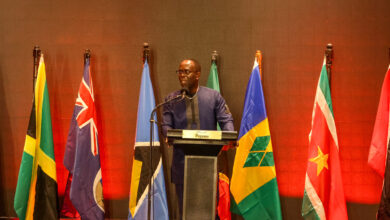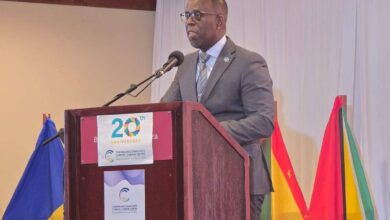Heads of Government, at their Fifth Special Meeting held in Barbados on 16 December 1996 reviewed the issues of co-operation between the United States and Governments of the Caribbean Community in the fight against the illicit drug trade within the broad context of U.S./CARICOM relations.
Heads of Government recognised the fundamental coincidence of interest of CARICOM Member States and the U.S. in a peaceful, stable and prosperous Caribbean. To that end, they reaffirmed the importance of a health relationship with the U.S. based on respect for sovereignty and territorial integrity, dialogue, consultation and mutually beneficial co-operation.
Heads of Government recognised that narco-trafficking and its associated evils of money laundering, gun smuggling, corruption of public officials, criminality and drug abuse constitute the major security threat to the Caribbean today. They noted the vulnerability of the Region to the illicit drug trade through the destruction caused to civil societies and the possible use of the Region’s territory for illegal narcotic transhipments to North America and Europe. They reaffirmed their commitment to the campaign for the elimination of drug abuse and illicit trafficking in drugs and to co-operate through bilateral and multilateral efforts in accordance with the provision of relevant international conventions. In this regard, they stressed the need for appropriate emphasis to be given in the campaign to control the different aspects of the drug trade-production, distribution, consumption and money laundering.
They also noted with deep concern the growth in the allied problem of gun smuggling and the resulting increase in criminal activity from the spread of drugs and guns. They urgently called for further measures to control the supply and illicit trade in guns which present a serious security threat to Caribbean societies.
Heads of Government noted with equal concern the challenge facing the Region from indiscriminate deportations leading to increase in criminality. In this regard, they called for greater co-operation in deportation procedures.
Heads of Government recognised the right of sovereign countries to enter into mutually acceptable agreements. They also rejected any suggestion or threat of coercive measures as a means of extracting compliance with predetermined policies. They warned that unfounded allegations, innuendoes and the threat of punitive measures, aimed at the economic welfare of Caribbean States, would only weaken the collective effort against drug trafficking and undermine the foundations of the good relations which the Region has enjoyed and seeks to maintain with the U.S. They stressed the need for dialogue and a spirit of partnership in a common cause.
They acknowledged the need for comprehensive co-operation and technical assistance in counter-narcotics operations, in the light of limited capabilities and resources and welcomed offers made for such assistance in drug interdiction. They underlined the importance of ensuring that all such programmes are based on full respect for the territorial integrity and the legal systems of Caribbean States. They expect that all the requisite procedures will be conducted in accordance with national constitutions and laws.
In order to promote meaningful dialogue, they called for an adequate and timely flow of all necessary information, a willingness to engage in mutual discussions before final assessments of performance are made and a preparedness to provide all available evidence, so that such allegations as may eventually be made public, can be substantiated in accordance with relevant law.
Heads of Government recalled that, in order to enhance counter-narcotics co-operation, they adopted in July 1996 a Regional Plan of Action against drugs. It was noted that such a Plan specifically provided for numerous bilateral co-operation agreements in maritime interdiction to be consolidated into a regional agreement. In this regard, and in keeping with Article 17 of the CARICOM Treaty, they decided to establish an Inter-Governmental Task Force charged with proposing a mechanism for implementation of the plan.
Heads of Government also expressed the view that greater co-ordination was desirable at the hemispheric level, in light of the broad dimensions of the problem and the need for effective interaction and co-operation involving all countries. To this end, they endorsed the proposal for a regional meeting with a view to a hemispheric conference to review all the elements of the problem of drug trafficking and to devise a strategic plan towards its elimination, as called for by the recently concluded Third Ministerial Conference of CARICOM and Central American Foreign Ministers.
While recognising the critical importance of the fight against illegal drugs, the Heads of Government emphasised that this should not be dealt with in isolation from the wider problems of development in the Caribbean.
It was decided that in closer consultation between CARICOM Member States and the U.S. needed to take place on a range of pressing issues to Member States including NAFTA parity, the special position of the smaller economies in the FTAA process and the legitimate concerns of the banana-producing countries. It was therefore agreed that the Chairman of CARICOM should convey to the President of the U.S. the concerns of CARICOM Heads of Government and should request a meeting at the highest possible level at the earliest opportunity in 1997.
Heads of Government agreed to make much more effective use of the mechanisms for foreign policy co-ordination in the Treaty of Chaguaramas.





